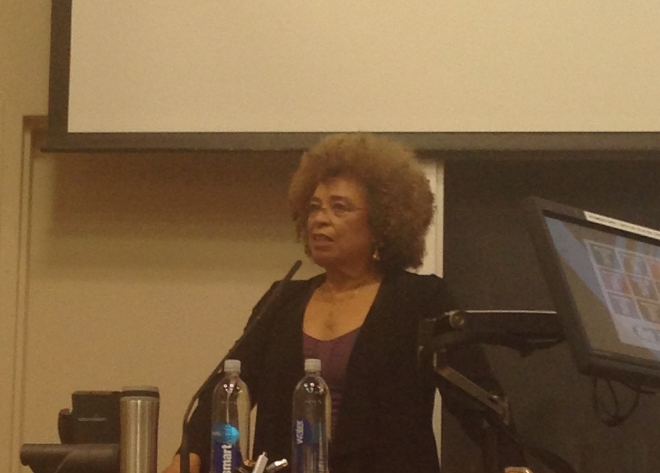
Activist. Radical. Legend.
Students packed into Fisk 217 Monday night, to hear world-renowned scholar Angela Davis talk about the different forms of oppression in today’s society. Boisterous applause erupted from the crowd as Davis entered the room, and the clamorous praise continued throughout the lecture.
Davis, who famously spent more than a year on the FBI’s “Ten Most Wanted” list, spoke about various social issues, including mass incarceration and racism. Regarding incarceration, Davis spoke about the institution of the prison as having outgrown its usefulness.
“Virtually every era of prison reform in this country has produced a stronger and more repressive prison system,” Davis said.
Davis continued, saying she believes conservatives such as Newt Gingrich look at the institution of prison in the wrong way.
“They are opposed to what they call mass-incarceration because they think that it is perhaps the most dramatic sign of the expansion of government,” Davis said. “It’s about saving money; they see mass incarceration simply as a financial project that demands resources from the government.”
In talking about racism, Davis mentioned the recent scandal with Donald Sterling and the L.A. Clippers. Though dealing with racism on an individual level is important, Davis discussed the important of going even further.
“Without looking deep into the structures, we will never purge our world of this persisting racism,” Davis said. “And it will continue forever, if we do not figure out how to have a conversation about the nature of racism in this society. And how to do it without the conventional reactions.”
Davis said memories of slavery and old racism is still embedded in the institutions and practices of today, including capital punishment and the death penalty. She also said the idea of the prison is something not many people understand correctly, due in part because of media and cinema portrayals of jails.
As a part of the discussion about prisons, Davis also said the idea of prison is primarily associated with men, but that people should look beyond gender stereotypes. Davis also discussed the gender exclusion in the penitentiary system, saying that people need to stand up for the rights of a transgender person within the prison system.
Davis grew up in the midst of the mid-twentieth century struggles surrounding segregation. She was active in the Civil Rights movement, where she associated with the Black Panthers. In 1970 she was put in jail for several months for her involvement in a solidarity campaign for three imprisoned men. She is now a Distinguished Professor Emerita at the University of California, Santa Cruz.
Davis urged attendees to think outside the box regarding issues that are deeply grained in the American consciousness.
“Why do we think so myopically?,” Davis asked the nearly 400 attentive listeners in the audience. “We should assume more complicated positions. We needed to be critical in our resistance.”
The event, which is a part of the NU Contemporary Thought Speaker Series, drew a crowd of diverse individuals, ranging from students to faculty to Evanston residents.
The CTSS aims to bring diverse speakers to campus, which recently included acclaimed playwright Tony Kushner and Teach for America founder Wendy Kopp. CTSS hope the lectures bring together student groups to engage with each other on issues not typically discussed at Northwestern.
And according to lecture attendees, Davis was the perfect speaker to come to NU.
“She’s so radical and wonderful at the same time, I wasn’t really expecting to see her here,” said Communication junior Sara Fadlalla. “But having her here brought me the most school pride I think I’ve had since I’ve been at Northwestern.”
Fadlalla said Davis talked about issues using personal experiences, and in a way that was clear for everyone in the audience to understand.
Medill freshman Sierra Boone agreed that Davis’ talk was extraordinary and extremely pertinent.
“She’s just so real and raw about things that need to be talked about, especially on this campus,” Boone said. “Just talking about issues that many times go unheard or that are pushed under the rug was completely welcoming.”